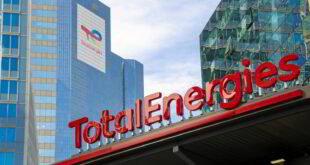Qatar announced plans on Wednesday to boost its liquefied natural gas (LNG) production capacity. which will put the tiny state on a par with top energy exporters in an apparent show of strength amid a protracted political row with Gulf neighbors.
Qatar is one of the Organization of the Petroleum Exporting countries’ smallest producers but is also one of the most influential players in the global LNG market due to its massive output capacity and gas reserves.
Qatar Petroleum (QP). the world’s top supplier of LNG. said it was adding a fourth LNG production line to raise its output capacity from the North Field. to 110 million tonnes a year.
This is an increase of around 43 percent from its current production capacity of 77 million tonnes a year.
“Based on the good results obtained through recent additional appraisal and testing. we have decided to add a fourth LNG mega train.“ Saad Sherida Al-Kaabi. the CEO of the state energy giant. said in a statement.
“This will increase Qatar’s total production capacity from 4.8 to 6.2 million barrels of oil equivalent per day.“
Russia. a major oil and gas producer. pumps around 11 million barrels of crude per day. while Saudi Arabia. the world’s top oil exporter. produces about 10.5 million bpd of crude.
The timeframe for completion to reach the new capacity is expected by the end of 2023 or early 2024. according to a source familiar with the project execution.
Additional gas volumes available for exports will mean more revenue for the state budget and more cash for Qatar Investment Authority. the country’s sovereign wealth fund. to invest abroad. the source said.
“The budget surplus will increase significantly reaching almost 160 billion Qatari riyals in 2024. This would more than cover the estimated external debt.“ the source said.
GROWTH AMBITIONS
For Qatar. which is locked in a dispute with four Arab states. broadening its investments outside the Middle East would cement its position as the world’s largest LNG supplier and help it to weather the boycott with its neighbors.
In June last year. Saudi Arabia. the United Arab Emirates. Bahrain and Egypt cut diplomatic. economic and transport ties with Qatar. accusing it of backing terrorism. a charge which Doha denies.
Last year. QP said it was planning to develop additional gas from the North Field and build three new LNG mega trains. hinting at a possibility of adding a new train and further boost output potential.
QP is in talks with international oil companies for the new expansion project. Oil companies operating in Qatar now include ExxonMobil. Total and Royal Dutch Shell. The company will make a decision on the foreign partners by the end of 2018. QP’s CEO had said.
In April last year. Qatar lifted a self-imposed ban on the development of the North Field. the world’s biggest natural gas field which it shares with Iran. last year and announced a new project to develop its southern section. increasing output in five to seven years.
The decision to boost its LNG output capacity came after Qatar was in talks to supply pipeline gas to Saudi Arabia and increase supplies to UAE. QP’s CEO told Reuters in May. The plans to supply the two Gulf nations were halted due to the dispute but QP went ahead anyway with its LNG expansion instead.
The new project announced on Wednesday will produce about 32 million tonnes per year of LNG. 4.000 tonnes a day of ethane. 260.000 barrels a day of condensate. and 11.000 tonnes a day of LPG. in addition to approximately 20 tonnes per day of pure helium. QP said in the statement.
“Since Qatar announced its initial plan. the market environment has improved. Forecasts of future oil prices are higher and forecasts of future LNG demand have grown stronger. particularly in Europe and China.“ said Giles Farrer. research director. at Wood Mackenzie consultancy.
“Another train could mean another partnership opportunity. furthering Qatar Petroleum’s international growth ambitions.“
 Iran Energy News Oil, Gas, Petrochemical and Energy Field Specialized Channel
Iran Energy News Oil, Gas, Petrochemical and Energy Field Specialized Channel




